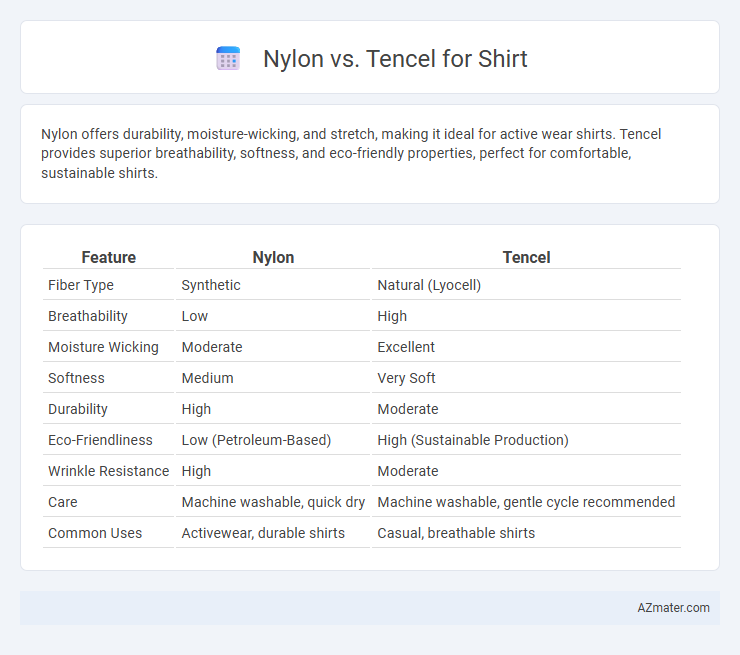Nylon offers durability, moisture-wicking, and stretch, making it ideal for active wear shirts. Tencel provides superior breathability, softness, and eco-friendly properties, perfect for comfortable, sustainable shirts.
Table of Comparison
| Feature | Nylon | Tencel |
|---|---|---|
| Fiber Type | Synthetic | Natural (Lyocell) |
| Breathability | Low | High |
| Moisture Wicking | Moderate | Excellent |
| Softness | Medium | Very Soft |
| Durability | High | Moderate |
| Eco-Friendliness | Low (Petroleum-Based) | High (Sustainable Production) |
| Wrinkle Resistance | High | Moderate |
| Care | Machine washable, quick dry | Machine washable, gentle cycle recommended |
| Common Uses | Activewear, durable shirts | Casual, breathable shirts |
Introduction to Nylon and Tencel Shirts
Nylon shirts offer exceptional durability, lightweight comfort, and moisture-wicking properties, making them ideal for activewear and outdoor clothing. Tencel shirts, made from sustainably sourced wood pulp, provide superior breathability, softness, and natural antibacterial qualities perfect for sensitive skin and casual wear. Both fabrics excel in performance but cater to different needs: nylon emphasizes strength and quick drying, while Tencel prioritizes eco-friendliness and comfort.
What is Nylon? Key Features for Shirts
Nylon is a synthetic polymer known for its exceptional strength, elasticity, and resistance to abrasion, making it ideal for durable and long-lasting shirts. Its moisture-wicking properties and quick-drying nature enhance comfort, especially in activewear, while its smooth texture contributes to a sleek, wrinkle-resistant finish. Nylon shirts are lightweight, breathable, and maintain their shape well, providing a practical choice for both casual and performance apparel.
What is Tencel? Key Features for Shirts
Tencel is a branded lyocell fiber derived from sustainably sourced wood pulp, known for its eco-friendly production process and biodegradable properties. Key features of Tencel shirts include superior moisture-wicking ability, breathability, and a silky smooth texture that provides comfort and reduces skin irritation. Compared to nylon, Tencel offers enhanced softness, natural odor control, and better temperature regulation, making it ideal for shirts designed for all-day wear and sensitive skin.
Comfort and Softness: Nylon vs Tencel
Tencel fibers provide superior softness and breathability compared to nylon, making shirts more comfortable for prolonged wear. Nylon, while durable and moisture-wicking, tends to feel less gentle against the skin and can trap heat, reducing overall comfort. Shirts made from Tencel offer a smoother texture and enhanced moisture management, ideal for sensitive skin and warm climates.
Moisture Management and Breathability
Nylon offers excellent durability and moisture-wicking properties, making it effective at pulling sweat away from the skin to keep wearers dry during physical activities. Tencel, derived from wood pulp, provides superior breathability and natural moisture absorption, allowing for enhanced comfort and quick drying. When choosing between Nylon and Tencel for shirts, Nylon excels in active moisture management, while Tencel ensures better overall airflow and softness against the skin.
Durability and Lifespan Comparison
Nylon offers exceptional durability with high resistance to abrasion, making it ideal for long-lasting shirts that withstand frequent wear and washing. Tencel, derived from natural fibers, provides moderate durability but excels in breathability and softness, though it may show signs of wear faster than nylon over time. When comparing lifespan, nylon shirts generally maintain structural integrity and color longer, while Tencel shirts require more delicate care to preserve their appearance and performance.
Sustainability and Environmental Impact
Tencel, derived from sustainably sourced wood pulp, offers a more eco-friendly alternative to nylon due to its biodegradable properties and lower water consumption during production. Nylon, a synthetic polymer made from petrochemicals, contributes significantly to greenhouse gas emissions and microplastic pollution, posing long-term environmental challenges. Choosing Tencel shirts supports reduced carbon footprints and waste, aligning with sustainable fashion initiatives.
Care, Maintenance, and Wrinkle Resistance
Nylon shirts offer excellent wrinkle resistance and require minimal ironing, making them ideal for low-maintenance wardrobes. Tencel fabric, while naturally breathable and moisture-wicking, demands gentler care with cold water washing and air drying to preserve its softness and prevent shrinkage. Both materials benefit from avoiding high heat in drying; however, nylon is generally more durable and less prone to damage from regular machine washing compared to Tencel.
Style, Color Retention, and Fabric Feel
Nylon shirts offer a sleek, glossy finish that enhances modern styles, while Tencel provides a soft, matte texture ideal for casual and eco-conscious fashion. Tencel excels in color retention due to its moisture-wicking properties, maintaining vibrant hues even after multiple washes, whereas nylon tends to fade faster under frequent laundering. The fabric feel of Tencel is breathable and smooth with a natural drape, contrasted by nylon's lightweight, slightly elastic feel that resists wrinkles but can feel less breathable.
Which Is Better: Nylon or Tencel for Shirts?
Tencel offers superior breathability and moisture-wicking properties, making it ideal for shirts designed for comfort and sustainability. Nylon excels in durability and elasticity, providing wrinkle resistance and longevity, particularly suitable for activewear or travel shirts. For everyday wear prioritizing softness and eco-friendliness, Tencel is better, while Nylon is preferred for performance and durability-focused shirts.

Infographic: Nylon vs Tencel for Shirt
 azmater.com
azmater.com